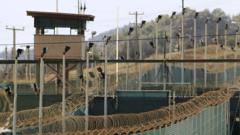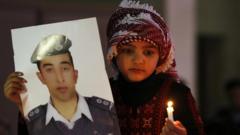The plea deals for Khalid Sheikh Mohammed, accused of orchestrating the 9/11 attacks, have been postponed after the U.S. government intervened, arguing it would be harmed by the agreements that would prevent a death penalty trial.
9/11 Plea Agreements Put on Hold Amid Government Objections

9/11 Plea Agreements Put on Hold Amid Government Objections
The U.S. government intervenes to delay guilty pleas from mastermind Khalid Sheikh Mohammed and co-defendants, raising concerns over capital punishment.
Article Text:
The anticipated guilty pleas from Khalid Sheikh Mohammed, the alleged mastermind behind the September 11 terrorist attacks, have been delayed following a government objection that seeks to block previously negotiated plea deals. Mohammed, along with two co-defendants, had planned to confess to all charges on Friday in exchange for assurances against facing a death penalty trial.
However, the Justice Department filed a motion with a federal appeals court arguing that allowing the pleas to proceed would irreparably harm the government’s interests. The court decided it would need additional time to review the circumstances surrounding the plea agreements, thus temporarily halting the proceedings. The court has yet to determine whether Defence Secretary Lloyd Austin holds the authority to revoke the plea arrangement established by a senior official he appointed.
This decision comes on the heels of a military judge and an appellate panel's earlier rejection of Austin's attempts to nullify similar agreements. The families of some victims from the catastrophic attacks on 9/11 expressed mixed feelings about the plea deals, with some viewing them as a necessary step to advance the prolonged case, while others decried the perceived leniency afforded to the defendants.
The government expressed that moving forward with the plea deals would impede its ability to pursue capital punishment against three men accused of perpetrating a horrific act that led to the deaths of nearly 3,000 individuals and left a profound impact on the nation and world at large. It justified its call for a brief postponement by stating that it would not significantly harm the defendants during this critical period.
Khalid Sheikh Mohammed has been held in U.S. custody for over two decades, with pre-trial hearings dragging on for more than ten years. Disputes in the court have largely revolved around the influence of torture experienced by the defendants while in CIA custody following their arrests. Mohammed reportedly endured horrific interrogation practices, including simulated drowning, commonly known as waterboarding, along with other severe methods like sleep deprivation.
Families of the 9/11 victims have expressed dissatisfaction with the repercussions of the ongoing delay. Terry Strada, whose husband perished in the attacks, condemned last year's plea arrangements as overly accommodating for the detainees. Conversely, some relatives, frustrated by the slow pace of the case, argue that securing convictions is imperative before the defendants age further or deteriorate in health.
Stephan Gerhardt, who lost his brother in the attacks, traveled to Guantanamo Bay to witness Mohammed’s anticipated guilty plea. He described the potential plea agreements as imperfect but necessary for closure, stating that it would be a tragic moral failure for the accused to pass away without facing justice.
As the legal proceedings continue to unfold, the complex and poignant legacy of the September 11 terrorist attacks remains a focal point of both national and global attention.
The anticipated guilty pleas from Khalid Sheikh Mohammed, the alleged mastermind behind the September 11 terrorist attacks, have been delayed following a government objection that seeks to block previously negotiated plea deals. Mohammed, along with two co-defendants, had planned to confess to all charges on Friday in exchange for assurances against facing a death penalty trial.
However, the Justice Department filed a motion with a federal appeals court arguing that allowing the pleas to proceed would irreparably harm the government’s interests. The court decided it would need additional time to review the circumstances surrounding the plea agreements, thus temporarily halting the proceedings. The court has yet to determine whether Defence Secretary Lloyd Austin holds the authority to revoke the plea arrangement established by a senior official he appointed.
This decision comes on the heels of a military judge and an appellate panel's earlier rejection of Austin's attempts to nullify similar agreements. The families of some victims from the catastrophic attacks on 9/11 expressed mixed feelings about the plea deals, with some viewing them as a necessary step to advance the prolonged case, while others decried the perceived leniency afforded to the defendants.
The government expressed that moving forward with the plea deals would impede its ability to pursue capital punishment against three men accused of perpetrating a horrific act that led to the deaths of nearly 3,000 individuals and left a profound impact on the nation and world at large. It justified its call for a brief postponement by stating that it would not significantly harm the defendants during this critical period.
Khalid Sheikh Mohammed has been held in U.S. custody for over two decades, with pre-trial hearings dragging on for more than ten years. Disputes in the court have largely revolved around the influence of torture experienced by the defendants while in CIA custody following their arrests. Mohammed reportedly endured horrific interrogation practices, including simulated drowning, commonly known as waterboarding, along with other severe methods like sleep deprivation.
Families of the 9/11 victims have expressed dissatisfaction with the repercussions of the ongoing delay. Terry Strada, whose husband perished in the attacks, condemned last year's plea arrangements as overly accommodating for the detainees. Conversely, some relatives, frustrated by the slow pace of the case, argue that securing convictions is imperative before the defendants age further or deteriorate in health.
Stephan Gerhardt, who lost his brother in the attacks, traveled to Guantanamo Bay to witness Mohammed’s anticipated guilty plea. He described the potential plea agreements as imperfect but necessary for closure, stating that it would be a tragic moral failure for the accused to pass away without facing justice.
As the legal proceedings continue to unfold, the complex and poignant legacy of the September 11 terrorist attacks remains a focal point of both national and global attention.


















